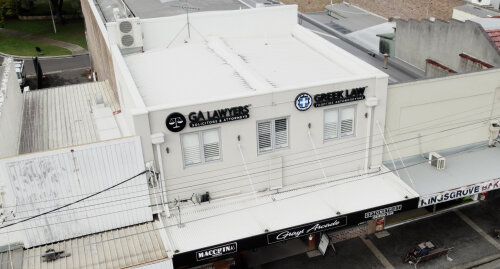Best Divorce & Separation Lawyers in Sydney
Share your needs with us, get contacted by law firms.
Free. Takes 2 min.
Free Guide to Hiring a Family Lawyer
List of the best lawyers in Sydney, Australia
About Divorce & Separation Law in Sydney, Australia
In Sydney, Australia, divorce and separation are governed by the Family Law Act 1975. This legislation provides a framework for individuals seeking to resolve issues that arise when a relationship comes to an end. The family law system in Australia is designed to assist separating couples in making arrangements for their children, property, and financial support. It encourages amicable resolutions but also provides for legal proceedings where necessary. For those residing in Sydney, legal services and resources are available to guide individuals through this often challenging process.
Why You May Need a Lawyer
While some couples can end their relationship without legal assistance, there are several situations where seeking legal advice might be beneficial or necessary:
- Complex Property and Financial Arrangements: When significant assets, debts, or complex financial structures are involved, legal guidance may be essential to ensure fair division.
- Child Custody Disputes: Disagreements about parenting arrangements can benefit from professional mediation or legal intervention to prioritize children's well-being.
- Domestic Violence Prevention: Individuals needing protection from family violence can obtain legal support to secure safety measures such as injunctions or restraining orders.
- Spousal Maintenance: If financial support from a former spouse is necessary, a lawyer can assist in negotiating and formalizing support agreements.
- Interstate or International Considerations: Cross-jurisdictional elements may introduce additional complexities requiring specialist legal advice.
Local Laws Overview
The legal framework for divorce and separation in Sydney is primarily based on the Australian Family Law Act 1975. Key aspects include:
- No-Fault Divorce: The only ground for divorce in Australia is the irretrievable breakdown of the marriage, proven by living separately for at least 12 months.
- Parenting Orders: Courts can issue orders regarding the care, welfare, and development of children to ensure their best interests are prioritized.
- Property and Financial Settlements: Divorcing couples can divide their property by agreement or through a court order based on contributions and future needs.
- Spousal Maintenance: Courts may order financial support for a former spouse if they cannot support themselves adequately.
Frequently Asked Questions
What is the process for obtaining a divorce in Sydney?
To obtain a divorce, you must file an application with the Federal Circuit and Family Court of Australia. You will need to demonstrate that the marriage has irretrievably broken down and that you have been separated for at least 12 months.
Can we still be living under the same roof and be considered separated?
Yes, it is possible to be considered separated while living under the same roof. You will need to provide evidence that you have separated within the same household, such as separate finances and a lack of a marital relationship.
How is child custody determined?
Child custody, known as ‘parental responsibility’ in Australia, is determined based on the best interests of the child. The court considers factors such as the child's relationship with each parent, the capacity of each parent to care for the child, and any history of family violence.
How are assets divided in a divorce?
Assets are divided based on a four-step process that considers the contributions of each party, both financially and otherwise, the future needs of each party, and what is a fair and equitable division of property.
Do we have to go to court to settle our divorce?
Not necessarily. Many couples resolve their separation through mediation or negotiation and by making consent orders, which are then approved by the court. Court is generally the last resort when an agreement cannot be reached.
What is the waiting period for a divorce to be finalized?
Once the court grants a divorce, it becomes final one month and one day after the hearing date. This allows time for any appeals to be lodged.
Is spousal maintenance mandatory?
Spousal maintenance is not automatic. You may receive it if you are unable to support yourself and your former partner has the capacity to pay. The amount and duration will depend on individual circumstances.
Can I change my child’s last name after separation?
Changing a child's name typically requires the consent of both parents or a court order, considering that it's in the best interest of the child.
What happens if my former partner doesn’t comply with court orders?
If a court order is not being followed, you may apply to the court to have the order enforced, or to vary the orders if necessary. Legal advice should be sought in such situations.
How can I protect myself financially during separation?
Ensure you have clear records of all assets, liabilities, and financial resources. It's advised to seek legal and financial guidance early to secure and understand your financial situation.
Additional Resources
These resources may provide valuable assistance or information relating to divorce and separation:
- Family Relationships Online: Provides information and advice about family changes, including separation.
- Legal Aid NSW: Offers free legal advice and can assist financially disadvantaged individuals.
- Federal Circuit and Family Court of Australia: The court where divorce proceedings and related family law matters are addressed.
- Relationships Australia NSW: Offers counseling, family dispute resolution, and mediation services.
- The Law Society of NSW: Can help you find a solicitor who specializes in family law.
Next Steps
If you require legal assistance with a divorce or separation in Sydney, consider the following steps:
- Seek Professional Advice: Consult a family law solicitor for tailored guidance specific to your circumstances.
- Gather Documentation: Compile records of assets, liabilities, income, and expenses relevant to your case.
- Consider Mediation: Explore mediation or family dispute resolution services to settle matters amicably where possible.
- Access Community Resources: Utilize services offered by organizations such as Relationships Australia and Legal Aid NSW.
- Remain Informed: Stay updated with changes in family law that may impact your situation.
Your circumstances will dictate the most appropriate course of action. Engaging with professional services early can often mitigate stress and result in more favorable outcomes.
Lawzana helps you find the best lawyers and law firms in Sydney through a curated and pre-screened list of qualified legal professionals. Our platform offers rankings and detailed profiles of attorneys and law firms, allowing you to compare based on practice areas, including Divorce & Separation, experience, and client feedback.
Each profile includes a description of the firm's areas of practice, client reviews, team members and partners, year of establishment, spoken languages, office locations, contact information, social media presence, and any published articles or resources. Most firms on our platform speak English and are experienced in both local and international legal matters.
Get a quote from top-rated law firms in Sydney, Australia — quickly, securely, and without unnecessary hassle.
Disclaimer:
The information provided on this page is for general informational purposes only and does not constitute legal advice. While we strive to ensure the accuracy and relevance of the content, legal information may change over time, and interpretations of the law can vary. You should always consult with a qualified legal professional for advice specific to your situation.
We disclaim all liability for actions taken or not taken based on the content of this page. If you believe any information is incorrect or outdated, please contact us, and we will review and update it where appropriate.

















